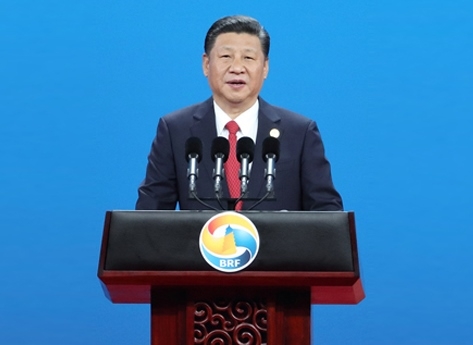Belt and Road Initiative “a project of the century” : President Xi Jinping

Beijing, May 14 (Xinhua) — Chinese President Xi Jinping on Sunday said the Belt and Road Initiative is “a project of the century” that will benefit people across the world.
Xi made the remarks when delivering a keynote speech at the opening ceremony of the two-day Belt and Road Forum for International Cooperation.
Named after the historic Silk Road, the Belt and Road Initiative was proposed by Xi in 2013 to chart out new territories for international cooperation.
“Spanning thousands of miles and years, the ancient silk routes embody the spirit of peace and cooperation, openness and inclusiveness, mutual learning and mutual benefit,” Xi told an audience of more than 1,500 from across the globe.
“The Silk Road spirit has become a great heritage of human civilization,” he said.
A total of 29 foreign heads of state and government leaders attended the forum, including Russian President Vladimir Putin.
Other delegates include officials, entrepreneurs, financiers and journalists from over 130 countries, and representatives of key international organizations, such as UN Secretary-General Antonio Guterres, World Bank President Jim Yong Kim, and Managing Director of the International Monetary Fund Christine Lagarde.
The United States sent a delegation led by Matt Pottinger, special assistant to the president and senior director for Asia at the National Security Council.
By all means, the forum, which also features a round-table summit of global leaders on Monday, is one of the premium gatherings in today’s world, and the most prestigious international assembly China has ever inaugurated.
At the center of its focus is Xi’s grand plan to better combine the rapidly expanding Chinese economy with the development of Asia, Europe and Africa.
Now a catchphrase both domestically and abroad, the Belt and Road Initiative is essentially a new inclusive platform on which countries in Eurasia and beyond can strengthen economic and cultural cooperation to achieve common prosperity.
By linking countries and regions that account for about 60 percent of the world’s population and 30 percent of global GDP, the initiative is a perfect example of China offering its own wisdom and solutions to global governance, said Wang Yiwei, a professor at the School of International Relations at Renmin University of China.
“It features inclusive and sustainable growth and takes into account development needs of different countries and regions for common prosperity,” he said.
Road for peace, prosperity
President Xi said the Belt and Road should be built into a road for peace, as the pursuit of the initiative requires a peaceful and stable environment.
“The ancient silk routes thrived in times of peace, but lost vigor in times of war. The pursuit of the Belt and Road Initiative requires a peaceful and stable environment.”
“We should foster a new type of international relations featuring win-win cooperation; and we should forge partnerships of dialogue with no confrontation and of friendship rather than alliance,” he said.
All countries should respect each other’s sovereignty, dignity and territorial integrity, each other’s development paths and social systems, and each other’s core interests and major concerns, said Xi.
“Some regions along the ancient Silk Road used to be a land of milk and honey. Yet today, these places are often associated with conflict, turbulence, crisis and challenge. Such state of affairs should not be allowed to continue,” said Xi.
He called for fostering the vision of common, comprehensive, cooperative and sustainable security, and creating a security environment built and shared by all.
“In pursuing the Belt and Road Initiative, we should focus on the fundamental issue of development, release the growth potential of various countries and achieve economic integration and interconnected development and deliver benefits to all,” he said.
He said, “We should establish a stable and sustainable financial safeguard system that keeps risks under control, create new models of investment and financing, encourage greater cooperation between government and private capital and build a diversified financing system and a multi-tiered capital market.”
Stressing infrastructure connectivity, Xi called for promoting land, maritime, air and cyberspace connectivity, focusing on key passageways, cities and projects, and connecting networks of highways, railways and sea ports.
China will contribute an additional 100 billion yuan (about 14.5 billion U.S. dollars) to the Silk Road Fund, President Xi said .
May 14 , 2017















